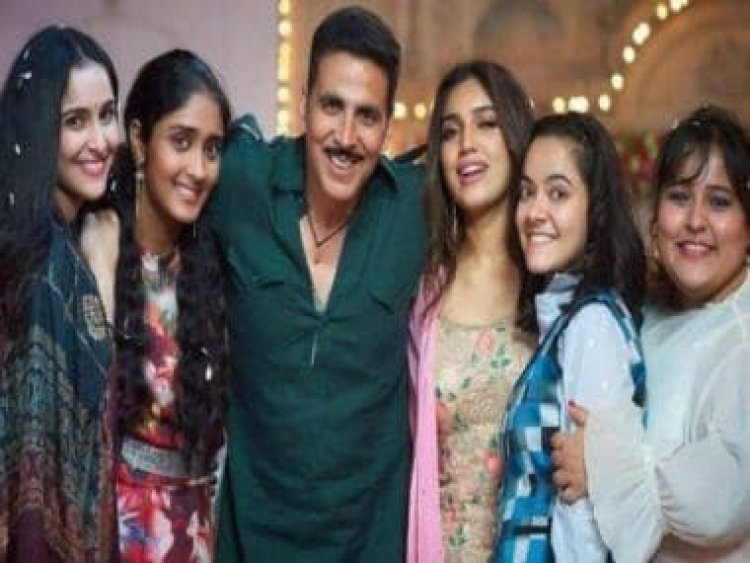Raksha Bandhan is a preachy, tedious film with some rather disturbing ideas about women
Raksha Bandhan is a preachy, tedious film with some rather disturbing ideas about women

Language: Hindi
Akshay Kumar films are now indistinguishable from the omnipresent PSA (public service announcement) ads shown before his and everybody else’s films. The one currently in circulation in Indian theatres was shot in the lead-up to Kumar’s film Pad Man, and so this ad features the actor being cloyingly preachy about the importance of sanitary napkins and the dangers of smoking — that’s a three-fer, because this promotional for a Bollywood film which became a generalised PSA about menstrual health also doubles up as an anti-tobacco advertisement. Every new Akshay Kumar film now feels a lot like sitting through two hours’ worth of these ‘janhit mein jaari’ (issued in public interest) advertisements, because the actor is seemingly only interested in moralising and treating the audience as though they were bawling infants, to be soothed and distracted by shiny baubles and squeaky toys.
The latest in this series of sermonising bores is Raksha Bandhan, directed by Aanand L. Rai (Raanjhanaa, Tanu Weds Manu). Kumar stars as Lala Kedarnath, the proprietor of his family’s long-running gol gappa shop at Chandni Chowk, which feels like his line cook character from Nikkhil Advani’s Chandni Chowk to China grew older and just as irritating. The word on the street—and I still can’t believe the film uses this as a selling point for the shop—is that young mothers who eat this shop’s gol gappas are blessed with sons (Salud! said Luca- Brasi-Patparganj-waale as he scarfed down his 6th while wishing that Don Corleon’s first grandchild be a masculine child).
If you think this is an ironic gag played for laughs, think again—the makers are deadly serious throughout with their ideas about women, ideas that would have felt outdated in the 1970s. Lala Kedarnath’s sisters aren’t really human beings so much as stand-ins for what the director and writers clearly think are the most egregious misfortunes that can visit a young woman. One sister is (gasp) dark-skinned, another is a tomboy while a third is a three-letter word starting with F (I’m only following the director’s lead and describing these things like the unspeakable sins they are presented as in Raksha Bandhan). Only Sadia Khateeb’s Gayatri is presented as the ideal, ‘sabhya, susheel’ young lady and to nobody’s surprise, this is a fair-skinned, conventionally pretty woman. All of the sisters, however, are a bojh (burden) upon Kedarnath, though, and the film never lets us forget this. Responsibilities, responsibilities, whatever is a dullard golgappa-vendor supposed to do?
It's difficult to overstate how arduous it is to sit through scene after scene of Kumar up to his usual slapstick comedy, trying to marry off his sisters. For Kedarnath, this is the mission he must accomplish on war footing, not least because he cannot marry his childhood sweetheart Sapna (Bhumi Pednekar) before his sisters are married and packed off to suitable households—he had given his vachan to his mother on her deathbed.
Pathos Kumar is even worse than Comic Kumar; in the emotional scenes the film’s leading man has phoned it in massively. During several tearjerking scenes, Kumar’s acting is so pedestrian that you can’t believe this person has been making movies since the last three decades — Malcolm Gladwell and his simplistic ten-thousand hours rule would have you believe that by now, even the most reluctant artist would have been composing arias, painting abstracts and staging O’Neill. But Gladwell has never met Kumar, as far as I can tell.
In the second half, there’s the very predictable shift from high dramedy to high tragedy, as dowry-related violence makes its presence felt in Kedarnath’s life, causing our hero to re-evaluate his life—but only very, very slightly, because we had just seen the man running from pillar to post to garner enough dowry money. Anything to get behen-ki-shaadi done and cross that off your list. And, of course, Kedarnath bhaiya is given approximately 17 hours to deliver a soporific monologue at the end, which sounds like a ‘beti bachao, beti padhao’ ad film, only much less entertaining.
The wise thing to do for Kumar is to stop the movie shenanigans altogether and cut out the middlemen, speak directly to the people with a microphone in hand. As it is, every third line from his movies sound like conservative talking points, with very little window dressing. Who knows, someday an opportunistic over-the-hill actor will interview him in a VFX-enabled garden, and ask him whether he likes mangoes.
Rating: 1 (out of 5 stars)
Raksha Bandhan is playing in cinemas
Aditya Mani Jha is a Delhi-based independent writer and journalist, currently working on a book of essays on Indian comics and graphic novels.
Read all the Latest News, Trending News, Cricket News, Bollywood News, India News and Entertainment News here. Follow us on Facebook, Twitter and Instagram.
What's Your Reaction?



























































